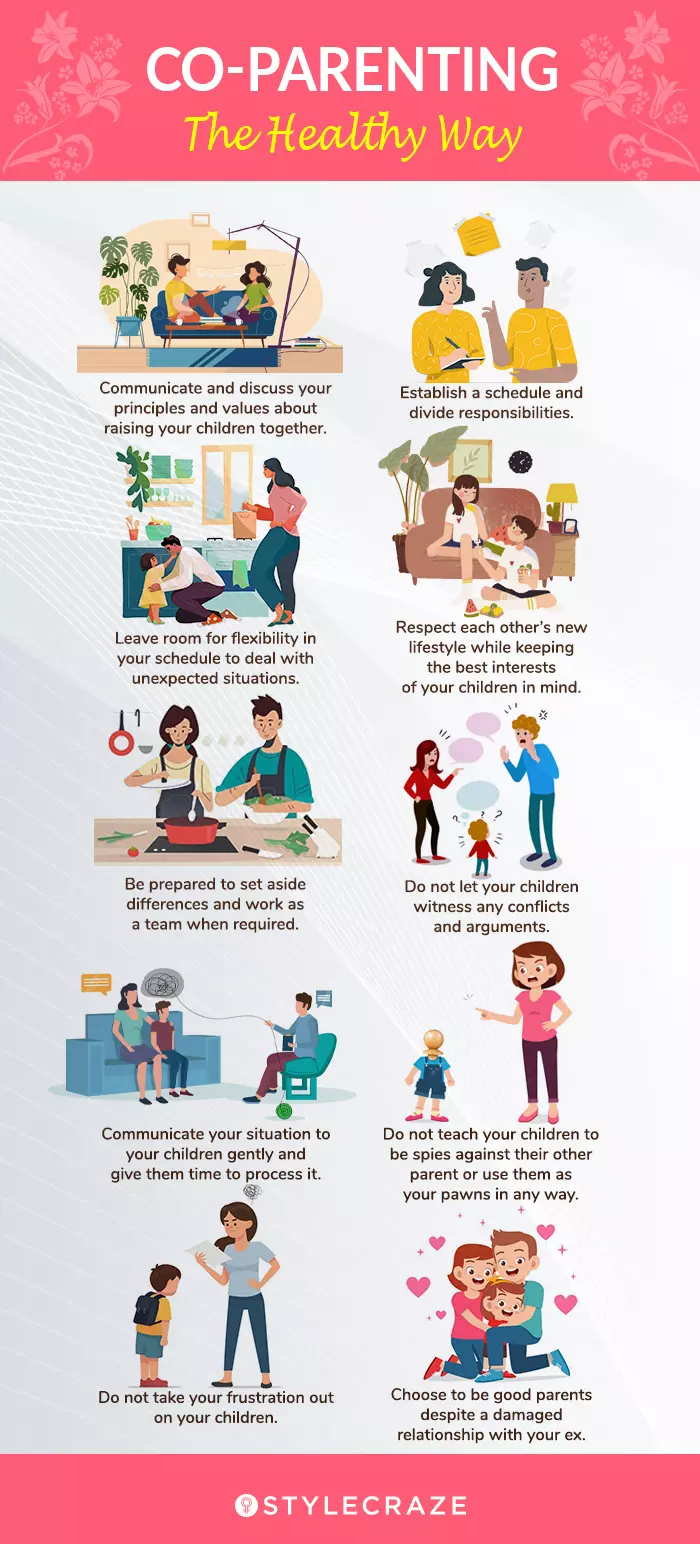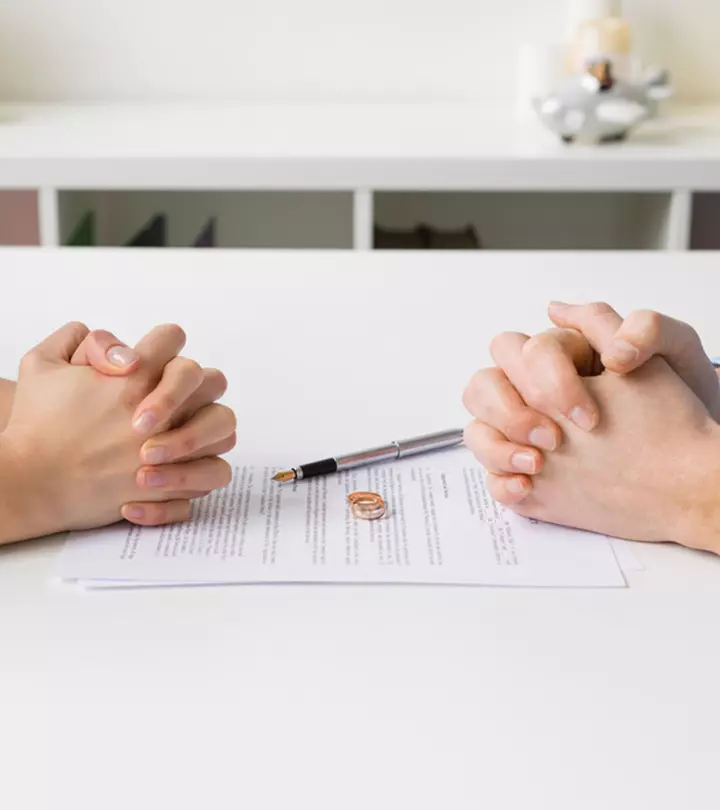Separated But Living Together – Some Real Facts To Know
Understand the dynamics of living together after separation to protect emotional stability.

Image: Shutterstock
There are plenty of reasons to end your relationship. However, some couples continue living under the same roof even after separation. But why do people live together after separation? How does it happen?
Many factors like financial instability, medical issues, unemployment, the need to support children, or even money disputes can cause couples to live together even after separating. While some couples may agree to stay together for their children, others may not feel comfortable. If you are in a similar dilemma, this post is for you. This article explores the reasons couples may choose to live together after separation, the different types of separation, and the tips to make it work. Continue reading.
In This Article
Separation And Divorce: What Is The Difference?
A separation is not the same as a divorce. Separation means you live apart from your spouse, but you are still legally married.
However, legal separation recognizes your separated status and separation agreement. On the other hand, divorce is the complete dissolution of your marital status.
Many couples choose to stay together even after separation and divorce. There could be multiple reasons for that. Let’s take a look at them.
Key Takeaways
- If a child is involved in your separation, there are financial disputes in a relationship, or there are any other such reasons, you might still be living with your ex-partner after separation.
- There are different types of separation: trial, permanent, and legal.
- It is important to maintain boundaries while in separation to avoid complications.
- Discuss the shared expenses and budget responsibly with your ex-partner at the very beginning to avoid future financial complications.
Reasons For Living Together After Separation
Research suggests that 23% of formerly cohabiting couples continue living together for two months or longer after the dissolution of the relationship (1). One-fifth of these co-residing couples stay in the arrangement for one year or longer. 70% of these separated couples generally report practical and logistical challenges as their reasons for cohabiting. Other important reasons as reported by approximately 25% of the respondents include financial constraints and raising young children. In particular, the existence of younger children is strongly related to both the probability of co-residence and the length of such arrangements. For many parents, staying in the same household provides stability for their children even if the relationship has ended. Continue reading for deeper insights on these aspects and more.
1. For The Sake Of The Kids

Separation or divorce can be tough on the children. Often, couples choose to live together after separation for the sake of their children and family. They want to ensure a safe and happy environment for the child and save them from the emotional trauma of choosing between parents and juggling two households, which also makes time management difficult for everyone. However, to stay in such an arrangement, couples have to overcome the negative feelings, anger, and sadness. This is commonly referred to as “parenting marriage.”
 Quick Tip
Quick Tip2. Seeking Reconciliation
Couples are often hopeful of reconciliation and may choose to live together after separation to give the relationship another shot.
Couples who opt for counseling also consider this a great arrangement. You can apply for a trial separation to understand what this situation entails and to help in coping with feelings. This gives you time to repair the marriage before you proceed with the divorce. It is always worth taking a shot if you can live peacefully with each other.
3. Buying Time

Divorce proceedings are complicated and time-consuming. In the meantime, this arrangement works well for couples. They can also deal with issues and compromise on various details, such as finance, child custody, alimony, etc. A legal separation gives you time for communication and negotiation without any hard deadlines. You always have an option to work it out or make the separation permanent.
4. Financial Concerns
Managing two households, child support, legal issues regarding inheritance or property, mortgage, etc., can complicate matters. Some couples opt to live together even though they are separated to cut down the financial burden. Couples who are separated can still avail of medical insurance benefits under the same plan and support each other financially.
5. Emotional Support
Separation might be hard if you have been together for long. Hence, living together following a separation provides emotional support to both the partners. It gives you your space without making you feel lonely. You can vent about your emotions to each other and rely on each other to help ease the pain while figuring out the best foot forward.
If you and your spouse want a break from the relationship, you can opt for separation before taking the tough route ( read divorce). While it is best to consult a lawyer regarding such discussions, the next section gives you an idea about the types of separation you may opt for.
Different Types of Separation

1. Trial Separation
This is a temporary phase where you and your partner live apart. A trial separation is best for couples who need time to decide on the future of their relationship. After the separation period is over, you can choose to live together and reconcile or go for permanent separation and divorce.
During the trial separation, you can go for an informal contract that addresses issues like expenses, shared parenting duties, and usage of bank accounts and credit cards. Since you are legally married, your finances and properties will come under joint ownership.
2. Permanent Separation
If your efforts for reconciliation have not worked out, permanent separation is the next step. While this does not mean you are divorced, the law recognizes your separation. This may change the property rights between you and your spouse. After permanent separation, you may no longer be entitled to your spouse’s income or possessions. Similarly, you cannot be held liable for any of your partner’s debts or loans.
3. Legal Separation

You can apply for a legal separation in some states. This is a legal status where you are not married but not divorced either. Also, you cannot remarry if you apply for legal separation. However, just like a divorce, the court decides on the division of property, child support, custody, and alimony.
 Quick Tip
Quick TipCouples opt for legal separation due to religious, political, or ideological differences but want to stay together for the sake of their kids. If you have decided to separate but live together, here are a few tips to make it easier for you.
Living Together After Separation: Tips To Make It Work

Here are a few tips for establishing ground rules and set clear boundaries to avoid complicating the situation:
- Avoid wearing wedding rings or any other symbolic adornments. This emphasizes the fact that you are no longer married and helps establish healthy boundaries and avoid confusion.
- Do not engage in romantic relationships. Sleep in different bedrooms and have your own personal space. You can also talk about living arrangements and demarcate the living or shared space, so you both have exclusive areas to yourselves. Establishing clear personal space in the relationship is key to preventing any further emotional entanglements and living with a sense of individuality and fulfillment.
- Share the household chores. You do not have to take responsibility for each other’s needs. You can cook separately, get separate groceries, and clean your part of the house. You can live like roommates – two individuals staying under one roof and sharing resources. Avoid doing chores for each other out of habit.
- Cut down on your time with each other unless you are co-parenting. Create a co-parenting schedule that divides responsibilities for school activities and decision-making regarding your children’s present and future. Communicate openly with your children about the situation, allowing them to understand it and cope better. You may also take the teacher into confidence and explain the situation to prevent any misunderstandings in the future.
- Avoid having meals together or going out if you have no intention of getting back together after separation. Try not to attend family gatherings or parties as a couple. Special occasions such as Thanksgiving, Christmas, Easter, and birthdays can be an exception, only if both are comfortable.
- Have separate budgets for household and personal expenses. Avoid pooling together personal expenses. This helps in setting clear financial boundaries.
- Limit socializing with mutual friends. You have your set of different friends and support systems.
- If you get back to dating, give a heads up to your partner. Be transparent but keep your private life private.
- Coordinate all the parenting activities with your partner. Make sure both of you follow up on your responsibilities so that the child is not neglected.
- Do not shout or have arguments in front of the children. Navigate difficult situations calmly and talk to each other. You can also take help from a counselor.
- Discuss ahead who you want to inform about your current living situation. Share information on a need-to-know basis to avoid complications. This holds true for friends, relatives, and acquaintances.
Martha Manning, a writer and clinical psychologist, shares her experience of living together with her ex-husband and how she navigated the situation through clear communication. She writes, “Without really articulating it, there was a silent sense that even though our marriage was over, it wasn’t too late for our relationship to change.” She continues, “Yeah, we should have done it a long time ago, and no, we were not getting back together in marriage, but our potential for connection- fireworks or apologies- is limitless (i).”
Sometimes, opting for a separation is inevitable, even if there is little opportunity to also live separately. Various legal options in place can help separated couples live together with the least possible conflict over interaction. These options help both parties progress forward to some extent with their individual lives. However, there is also a need for real measures to handle the emotional toll of the separation and associated processes on the concerned individuals. Let us understand the negative impact such a decision can have on the couple’s emotional well-being.
Emotional Effects Of Living Together After Separation
Even though the practicality of living together after separation might be necessary for financial or parenting reasons, it does come with its mixture of emotional struggles, affecting the healing process of involved individuals. Understanding these emotional challenges will help manage the situation and move towards a healthier, independent future.
- Fear Of Reconciliation: Living together may imply a possibility of reconciliation, and this can blur the lines when trying to mend and set definite boundaries.
- Increased Stress: The fact that they cannot really get away from each other can also increase stress. Co-residence after separation might make the living environment more argumentative and explosive, which could in turn affect mental well-being.
- Anxiety For The Future: Most people who are co-residing after separation have no idea about their future life, emotionally or financially, and this creates apprehension and insecurity.
- Effect On Emotional Healing: Due to prolonged co-residency, personal growth and healing can be slow as individuals may feel trapped in the relationship dynamic, unable to close the gaps to process emotions and heal effectively.
- Children’s Psychological Stress: When children are part of the household, cohabitation can be psychologically stressful for them. They may be exposed to constant arguing or feel torn between their parents, making them feel insecure and emotionally stressed.
- Isolation And Loneliness: Even though they are living together, separated couples might feel emotionally isolated because the dynamics of the relationship are no longer the same. This feeling of isolation can aggravate loneliness and disconnection.
- Lack Of Intimacy: When there is no emotional intimacy in a relationship following a breakup, it can leave both parties with feelings of being neglected or emotional emptiness. This makes fulfillment in daily life challenging.
- Problems With New Partners: If one or both separated partners begin dating someone new, co-residency complicates matters. New partners are often uncomfortable and feel disrespected by the presence of the ex-partners in such close proximity, breeding jealousy, insecurity, and trust issues.
- Feelings Of Shame: There is also the element of guilt or shame about living together because they may feel that they are not moving on, or that they are not allowing themselves to get over each other.
Recognizing and dealing with these emotional stressors caused by the condition of living together after separation can help in safeguarding mental health and supporting children if any as well. No matter what the case, the bottom line is to prioritize emotional health and make plans for a future where both parties can move on and thrive. However, co-residency following separation does not only pertain to emotional well-being. There are also some legal and financial constraints to being separated but living together. The next section ensures that both parties understand their rights and obligations as well as the financial arrangements that are fundamental to creating a healthy and sustainable environment during this challenging period. Keep reading.
Legal And Financial Considerations Of Living Together After Separation
When couples decide to separate but stay together, various legal considerations are involved. In many states, legal separation is an option that allows couples to remain married while establishing legal agreements regarding asset division, debt responsibilities, and child custody. Such considerations vary extensively depending on the state laws and the specific situation of the couple involved. Every state has its own rules and regulations related to marriage, separation, and divorce, which affects the rights and responsibilities of a couple in this particular situation. Understanding these consequences is important for effective management of personal and financial responsibilities.
- Marital Status: Even though spouses are separated or living apart, they remain technically married unless there is a finalized divorce or a legal separation has been granted. This means that they cannot marry anyone else unless their marriage has legally ended through a divorce.
- Legal Responsibilities: The couple also shares some responsibilities legally, which relate to fidelity and financial support. For example, based on state law, one spouse remains liable for the other’s debts acquired during the marriage.
- Division Of Assets And Debts: Couples that are separated but living together must discuss how they will divide the shared financial responsibilities. This includes the division of household expenses and debts, which can become contentious if there is no clear agreement.
- Ownership Of Property And Division: If the couple owns or rents the property together, then there will be a question of who should stay in the house or how the property will be divided in the future. It is hard to separate the responsibilities of paying any rent unless the lease is renegotiated or one party takes over the tenancy.
- Child Support And Custody: If children are involved, legal separation can help clarify custody arrangements and child support obligations. Courts usually encourage parents to formalize these arrangements for the stability of the children.
- Credit And Debt Impact: Joint financial accounts for purposes such as mortgages or loans, can complicate separation. Both parties may remain jointly responsible for payments, affecting credit scores if one party defaults.
Steve, who researches, experiments, and writes about personal development ideas, writes about his post-separation year after being married for 15 years. He shares, “We haven’t bothered to separate our finances yet, so everything there is still pooled. We’ve agreed to tackle this in the coming months, and I’d love to have that figured out by the end of the year, partly for tax and accounting reasons, but I suspect it will be challenging to work through all the little details since our career and financial lives are so interconnected (ii).”
- Tax Consequences: Legally separated individuals could have different tax consequences compared to married and divorced persons. In certain circumstances, they could file tax returns jointly that have some fiscal benefits.
- Evidence Of Separation: Couples who live together after separation have to prove separation if there arises a legal conflict, such as over property or custody. A court may be looking for some signs that indicate the couple has set up separate lives despite living together.
- Legal Paperwork: If possible, couples should put in writing any agreements made about their living situation, financial responsibilities, and boundaries. This will help prevent future disputes and provide a reference point if legal issues arise.
Cohabiting after separation comes with unique legal and financial issues that require thoughtful consideration and planning. The rights under state laws on legal separation and divorce must be considered in light of practical aspects of cohabitation. Consulting a family law attorney will help individuals obtain customized advice depending on the individual’s circumstances so that both parties can transition through this period as smoothly as possible.
Infographic: Co-Parenting The Healthy Way
One of the reasons estranged couples come together is to be good parents to their children. Divorce and separation can affect the child’s overall well-being in various ways, and it becomes quite tough for them to adjust to the situation. However, the consequences can be cushioned if both the parents take active and conscious steps to be present through every stage of their children’s lives.
Check out the infographic below to know how to co-parent in a healthy way. Illustration: StyleCraze Design Team
It is possible that you will have to live together following your divorce. Living together after a divorce is fraught with difficulties, and not everyone is okay with the idea. It is best to resolve conflicts peacefully if there is no other option and you choose to do so for your children and other obligations. Take notes from the article and talk about the options and ramifications with your friends and family before deciding. Also, evaluate the consequences. This will assist you in dealing with the problem maturely.
Frequently Asked Questions
What are the best practices for communication between separated partners?
Establish clear boundaries and maintain mutual respect while communicating with your ex-partner. It is crucial to have a calm tone when discussing shared responsibilities, especially kids. Additionally, try to focus on the issues at hand rather than delving into personal grievances to avoid emotional distress.
Who gets to stay in the house during separation?
This depends on whose name is on the title deed. If one spouse’s name is on the title deed, the other spouse has the choice of staying or leaving the house. If both partners are joint tenants, then both partners can stay in the house. Both partners should have a conversation about this and be on the same page.
How long should a separation last?
Both spouses can discuss and agree to the duration of the separation. Ensure that both partners set clear emotional boundaries and discuss their financial arrangements during the separation.
Can separated couples marry?
Yes, separated couples can remarry. However, the legal requirements for marriage post-separation differ by state in the US.
Can you sleep with your husband while separated?
The answer to this question is dependent on the laws of the state or country where the separation is taking place, and the specific terms outline in the court order or agreement.
It is generally not a good idea to indulge in intimacy if you are reconsidering the relationship. If the separation happened due to severe reasons, it is better not to sleep together, as it can affect mental and emotional rationality and decision-making power.
Can living separately save a relationship?
Yes, living separately can help both parties to work on their issues. If both parties are committed to making the necessary changes and working with a therapist or marriage counselor, the marriage can be saved.
What are the disadvantages of living together?
When living together, it becomes difficult to find personal space to work through wavering emotions. Moreover, in such confused times, it is often frustrating to live with one’s separated partner, as it might not feel any different than being married.
Illustration: Separated But Living Together - Some Real Facts To Know

Image: Stable Diffusion/StyleCraze Design Team
Living together while being separated can be stressful for both partners. This limbo phase needs careful consideration. The video below provides some effective strategies to navigate through this difficult time. Check it out!
Personal Experience: Source
StyleCraze's articles are interwoven with authentic personal narratives that provide depth and resonance to our content. Below are the sources of the personal accounts referenced in this article.
i. My Ex-Husband is Still Living with Me: “What’s Yours Isn’t Mine” Or is it?https://medium.com/the-memoirist/my-ex-husband-is-still-living-with-me-whats-yours-isn-t-mine-or-is-it-4be6263bcdc
ii. One Year After Separation
https://stevepavlina.com/blog/2010/11/one-year-after-separation/
References
Articles on StyleCraze are backed by verified information from peer-reviewed and academic research papers, reputed organizations, research institutions, and medical associations to ensure accuracy and relevance. Read our editorial policy to learn more.
- Living Together Apart: Size and Significance of Co-Residency Following Relationship Breakdown in Contemporary Britain
https://journals.sagepub.com/doi/10.1177/13607804241246411?icid=int.sj-abstract.citing-articles.1
Read full bio of Dr Nancy B Irwin
Read full bio of Sneha Tete
Read full bio of Asmita De
Read full bio of Gazala Firdos Ansari




























Community Experiences
Join the conversation and become a part of our empowering community! Share your stories, experiences, and insights to connect with other beauty, lifestyle, and health enthusiasts.